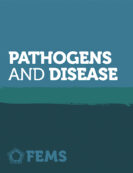microLife Poster Prize: Yuen Yan (Candice) Chang
Congratulations to Yuen Yan (Candice) Chang, from the Section on Microbial Pathogenesis, Eunice Kennedy Shriver National Institute of Child Health and Human Development (NICHD), National Institutes of Health (USA), for winning a Poster Prize at the Gordon Research Conference on Microbial Adhesion and Signal Transduction (GRC-MAST). This conference took place at Salve Regina University (USA) on 16 – 21 July 2023.
This award is sponsored by our journal microLife and as well as receiving a cash prize, we interviewed Candice to find out more about her prize winning research:
What has been your route through microbiology thus far?
I did my graduate study on identifying protein targets of a clinically available antimicrobial drug in Helicobacter pylori in Hong Kong. With an interest in host-pathogen interactions, I pursued my postdoctoral training in the Pasteur Institute, Paris, studying the distinct intracellular niches of two enterobacteria, Shigella flexneri and Salmonella typhimurium, within an infected host. I am currently continuing my career as a visiting fellow in the NIH, investigating the roles of bacterial effectors in the differential adaptation of Legionella pneumophila to diverse hosts.
Could you provide a brief and simple overview of the topic your oral presentation covers?
I presented my current research project on the characterization of a novel virulence factor in Legionella pneumophila at GRC-MAST. I identified a highly conserved virulence gene that is important for the growth of L. pneumophila in both the amoebal and the human macrophage hosts. My data showed that this novel virulence factor is translocated into host cells during infection and potentially interferes with the activity of the host E3 ligase. I am currently investigating the molecular mechanism by which this bacterial factor interacts with the host ubiquitination pathway and how the subversion of host ubiquitination benefits Legionella proliferation and disease progression in host cells.
What encouraged you to perform research in this area of microbiology?
Throughout my career development, I am thankful to have met several very awesome mentors that inspire me to devote in research on bacteria-host interactions and microbial pathogenesis. Having learnt that Legionella species expand their genomes after encountering different environmental eukaryotic hosts, I am passionate in investigating the selective pressures that drive the evolution of L. pneumophila to become a human pathogen. My on-going work will offer insight into the exploitation of the host ubiquitination pathway by microbial pathogens for intracellular survival.
What do you see as the next steps in this area of research?
Increasing numbers of reports have shown that bacteria encode virulence factors to mimic host factors and to hijack host pathways. I believe that elucidating the interplay between microbial pathogens and their hosts will potentially help deciphering the regulatory mechanisms of many cellular processes, offering insights in cell biology.
I hope my research would contribute to the understanding of how bacteria cope with antimicrobial administration as well as restrictive host environment, which would eventually advance the future development of therapeutics.
–
We use income from the FEMS Journals to fund grants, awards, and projects, and to support our knowledge sharing events and initiatives. Consider publishing your research with our journals to help the global microbiology community.
All but one of the FEMS journals are fully open access (OA), with one journal, FEMS Microbiology Letters, offering free-to-publish and OA options. Open access is key to supporting the FEMS mission of disseminating high quality research as widely as possible: when high quality, peer reviewed sound science is open access, anyone, anywhere in the world with an internet connection, can read it.







